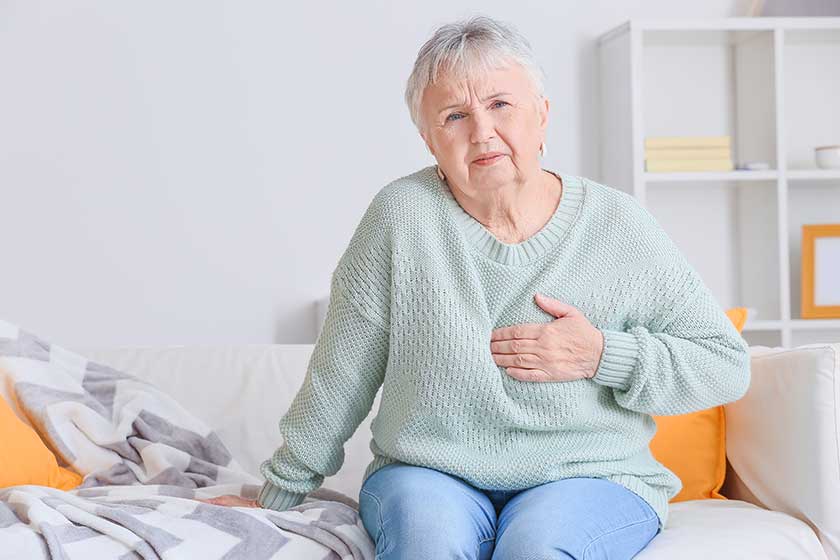Heart attacks, medically termed myocardial infarctions, are a pervasive and life-threatening cardiovascular event, claiming millions of lives globally each year. While commonly depicted as a sudden, crushing chest pain, the presentation of a heart attack can be far more nuanced, especially in elderly women. In this comprehensive guide, we delve into the distinct manifestations of heart attacks in elderly women, equipping you with the knowledge to recognize the signs early and take appropriate action. Because when it comes to heart health, awareness truly is the first line of defense.
Understanding Heart Attacks
Before delving into specific symptoms, it’s essential to grasp what happens during a heart attack. Also termed myocardial infarction, a heart attack happens when blood flow to a part of the heart is restricted for an extended period, leading to tissue damage. This blockage is typically caused by a buildup of plaque in the coronary arteries.
Typical Symptoms vs. Atypical Symptoms
While chest pain or discomfort is the most common symptom of a heart attack, elderly women may experience subtler signs or symptoms that are often mistaken for other conditions. It’s vital to recognize these atypical symptoms to ensure timely medical attention.
Unveiling the Complexity of Heart Attack Symptoms
Before we move on, let us unveil the complexity of heart attack symptoms.
The Gender Disparity in Symptom Presentation
Research suggests that women, particularly elderly women, are more likely to experience atypical symptoms during a heart attack compared to men. Although chest pain remains a hallmark symptom for many, elderly women may present with a diverse array of indicators, ranging from subtle discomfort to seemingly unrelated symptoms such as fatigue, nausea, or even back pain. This gender disparity underscores the importance of recognizing the unique symptomatology in elderly women to ensure timely diagnosis and intervention.
The Role of Age and Health Status
Age and underlying health conditions can further complicate the presentation of heart attack symptoms in elderly women. Chronic illnesses such as diabetes or hypertension may mask or mimic cardiac distress, making it challenging to differentiate between benign and life-threatening symptoms. Additionally, age-related changes in the cardiovascular system, such as decreased elasticity of blood vessels or impaired cardiac function, can influence symptom manifestation, necessitating heightened vigilance and tailored diagnostic approaches.
Navigating the Diagnostic Dilemma
Given the diverse and often ambiguous nature of symptoms in elderly women, accurate diagnosis poses a significant challenge for healthcare providers. Differential diagnosis must consider a broad spectrum of potential causes, including gastrointestinal issues, musculoskeletal pain, or anxiety disorders, to avoid misinterpretation and delays in treatment. Advanced diagnostic modalities, such as electrocardiography (ECG), cardiac biomarkers, and imaging studies, play a pivotal role in confirming or ruling out a heart attack, guiding appropriate management strategies, and optimizing outcomes for elderly female patients.
Signs to Watch for in Elderly Women
Now, let us learn more about what signs to look out for.
- Shortness of Breath: Elderly women experiencing a heart attack may feel short of breath even when at rest or during minimal exertion. This symptom can be mistaken for normal aging or respiratory issues.
- Fatigue: Unexplained fatigue, especially if it’s sudden and severe, could be a sign of a heart attack. Elderly women may feel unusually tired despite getting adequate rest.
- Nausea or Vomiting: Some elderly women may experience nausea, vomiting, or even indigestion during a heart attack. These gastrointestinal symptoms may occur without any apparent cause.
- Back, Shoulder, or Jaw Pain: Instead of chest pain, elderly women may feel discomfort in their back, shoulders, or jaw. This pain may come and go or persist over time.
- Dizziness or Lightheadedness: Feeling dizzy or lightheaded, especially when accompanied by other symptoms, could indicate a heart attack. Elderly women may also experience fainting spells.
- Cold Sweats: Profuse sweating, particularly cold sweats, can occur during a heart attack. This symptom is often overlooked or attributed to other factors.
Taking Action
Being able to observe the symptoms of a heart attack is only the first step; prompt action is important for saving lives. If you suspect that an elderly woman is experiencing a heart attack, it’s essential to:
- Call Emergency Services: Time is of the essence during a heart attack. Call emergency services immediately to ensure swift medical intervention.
- Administer Aspirin: If the person is conscious and not allergic to aspirin, giving them a chewable aspirin can help prevent further clotting.
- Stay Calm and Reassure: Keep the person calm and reassure them while waiting for medical help to arrive.
Taking Swift Action for Better Heart Health
Heart attacks in elderly women can present with atypical symptoms that may be overlooked or misinterpreted. By familiarizing yourself with these signs and taking prompt action, you can help ensure timely medical intervention and better outcomes. Remember, every second counts in a heart attack situation. Stay vigilant and be prepared to act swiftly to save lives.
At our assisted living facility, we understand the unique healthcare needs of elderly women, especially when it comes to heart health. Our dedicated team and healthcare professionals are trained to recognize and respond to the subtlest signs of a heart attack in our residents. From regular health screenings to personalized care plans, we prioritize proactive measures to mitigate cardiovascular risks and ensure early intervention when necessary.
With our comprehensive approach to senior care, including on-site medical services and specialized cardiac care programs, residents can rest assured that their health and safety are in capable hands. If you are seeking a supportive environment that prioritizes heart health and proactive care, please reach out to us. We are here to discuss how we can support the health and well-being of your loved ones.







